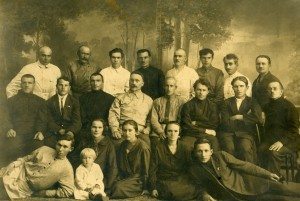Is a Family History Presentation Right for Your Reunion?

A family history presentation is a great way to share what you’ve learned. If you come from a large family, chances are that your aunts, uncles, cousins, and even your own descendants are spread out across the state or country. Once, it was easy to get everyone together for Sunday dinner and share the latest news. Today, we rely on Facebook and infrequent emails to keep us connected and reinforce those family bonds. But if you’re interested in genealogy, you may be considering a family reunion. Not only will you get to see long lost relatives and receive updates on cousins you lost track of, but this could be the perfect venue to share your passion for genealogy and ignite the interest of other relatives and younger generations.
How common are family reunions?
You may be wondering if it’s even a good idea to propose a family reunion. After all, if you don’t have a standing tradition of doing so, it’s going to take a lot of communication and preparation to do so. Still, the statistics suggest that reunions are popular and possible to pull together with some planning. According to the organization Group Travel, most family reunions occur in the summer. It’s usually best to give yourself between 12 and 18 months lead time to get on everyone’s schedule and allow for event planning and travel logistics. Most events are big success. 57% of those surveyed had between 50 and 149 attendees. If you’ve decided to go ahead with planning a reunion, here are some fun ideas to incorporate genealogy as a central theme of the get-together.
Ways to introduce genealogy into the program
It’s important to make genealogy just one aspect of a bigger agenda. Family reunions are about creating ties between living members, after all. However, there is probably no better venue for getting together a group of people interested in their ancestry. The key is to avoid long, dry presentations. Instead, focus on the most interesting parts and break up individual subjects that will allow guest to self-select their participation.
Consider a short presentation and a Q&A:
Consider giving a highlights presentation that offers insights into high-level topics that everyone is likely to find interesting. What countries did your ancestors come from? When did they arrive in the United States, and what general paths have they taken across the country? Do you have any notable connections or famous ancestors? Were there any fascinating people in your lineage or funny stories that you could share? Illustrate your presentation with a simple PowerPoint presentation that features photos, maps, and copies of documents for more visually-oriented guests.
Set up an info table:
Consider manning an information table for people that want to learn more. Bring copies of core documents and photographs. Don’t bring originals or your only copies, in case they get lost or someone wanders away with them. You can focus your conversations on the topics that interest your relatives, talk about the research process, and use it as command central to talk with family members you have questions for. Display items such as family antiques, historical wedding dresses, or portraits of ancestors to draw people in.
Create a giveaway:
Often, family reunions involve some kind of take home gift that could include a jar of Grandma’s signature preserves or a simple T-shirt that boasts surnames. Consider adding some sort of genealogy-themed item. This could include a small collection of photograph copies of ancestors printed into postcards or a short narrative that you’ve written up to accompany your presentation. Don’t forget to add any requests that you might have, such as information on specific ancestors or offering to act as a repository for your family’s historical photos.
Fun activities for kids:
Another tip is to offer stations with age appropriate activities for kids. For example, you might have a coloring station where kids can make paper dolls from specific eras and tell little stories that relate to your family history. Another idea is to ask a crafty family member to make some simple costumes from different countries or time periods, and invite kids to put on a play. Make genealogy fun as a gateway to exploration and discussion.
Are you considering a family history presentation at your next reunion? A professional genealogist can help you prepare or even give the presentation. Contact us at Price & Associates today to arrange for a personalized consultation and discuss how we can help make your get together memorable with a family history presentation.
